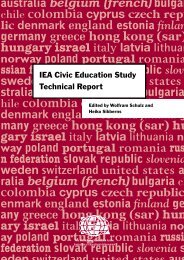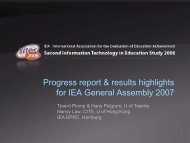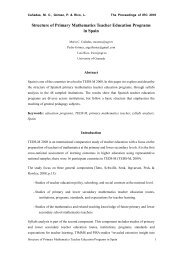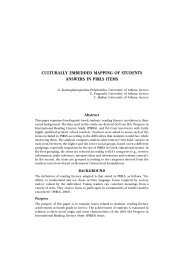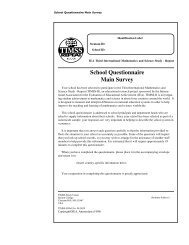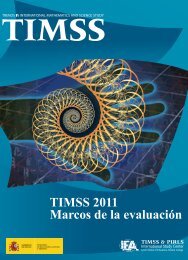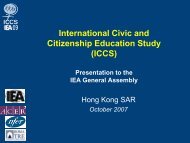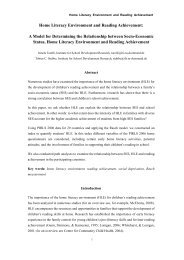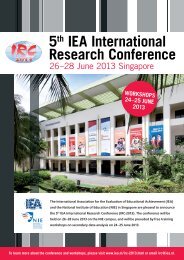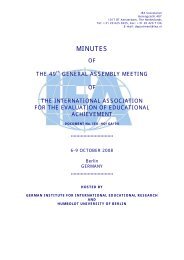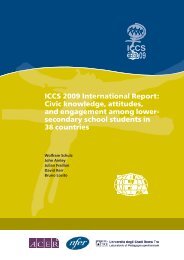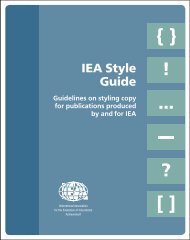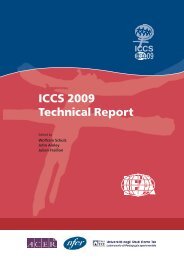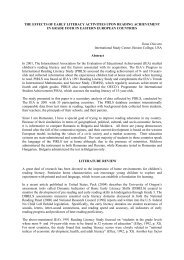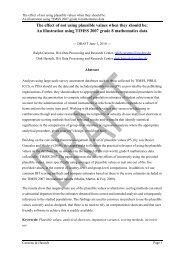International civic and citizenship education study - iccs - IEA
International civic and citizenship education study - iccs - IEA
International civic and citizenship education study - iccs - IEA
- TAGS
- civic
- citizenship
- iccs
- www.iea.nl
You also want an ePaper? Increase the reach of your titles
YUMPU automatically turns print PDFs into web optimized ePapers that Google loves.
Civic <strong>and</strong> <strong>citizenship</strong> cognitive domains<br />
To respond correctly to the ICCS cognitive test items, students need to know the core set<br />
of <strong>civic</strong> <strong>and</strong> <strong>citizenship</strong> content being assessed. Students also need to be able to apply more<br />
complex cognitive processing to their <strong>civic</strong> <strong>and</strong> <strong>citizenship</strong> knowledge <strong>and</strong> to relate their<br />
knowledge <strong>and</strong> underst<strong>and</strong>ings to real-world <strong>civic</strong> action.<br />
The two ICCS cognitive domains comprise the cognitive processes that students are expected<br />
to demonstrate in the ICCS cognitive test. The data derived from the test items constructed<br />
to represent the processes in the cognitive domains will be used to construct a global scale<br />
of <strong>civic</strong> <strong>and</strong> <strong>citizenship</strong> knowledge <strong>and</strong> underst<strong>and</strong>ings of the four content domains. The<br />
first cognitive domain, knowing, outlines the types of <strong>civic</strong> <strong>and</strong> <strong>citizenship</strong> information that<br />
students are required to demonstrate knowledge of. The second domain, reasoning <strong>and</strong> analyzing,<br />
details the cognitive processes that students require to reach conclusions. These processes are<br />
broader than the contents of any single piece of knowledge, <strong>and</strong> include the processes involved<br />
in underst<strong>and</strong>ing complex sets of factors influencing <strong>civic</strong> actions <strong>and</strong> in planning for <strong>and</strong><br />
evaluating strategic solutions <strong>and</strong> outcomes.<br />
Cognitive Domain 1: Knowing<br />
Knowing refers to the learned <strong>civic</strong> <strong>and</strong> <strong>citizenship</strong> information that students use when engaging<br />
in the more complex cognitive tasks that help them make sense of their <strong>civic</strong> worlds. Students<br />
are expected to recall or recognize definitions, descriptions, <strong>and</strong> the key properties of <strong>civic</strong> <strong>and</strong><br />
<strong>citizenship</strong> concepts <strong>and</strong> content, <strong>and</strong> to illustrate these with examples. Because ICCS is an<br />
international <strong>study</strong>, the concrete <strong>and</strong> abstract concepts students are expected to know in the<br />
core cognitive assessment are those that can be generalized across societies. There is scope in<br />
the regional modules (where applicable) to target regionally specific knowledge.<br />
Processes<br />
Define Identify statements that define <strong>civic</strong> <strong>and</strong> <strong>citizenship</strong> concepts <strong>and</strong> content.<br />
Describe Identify statements that describe the key characteristics of <strong>civic</strong> <strong>and</strong><br />
<strong>citizenship</strong> concepts <strong>and</strong> content.<br />
Illustrate with Identify examples that support or clarify statements about <strong>civic</strong> <strong>and</strong><br />
examples <strong>citizenship</strong> concepts <strong>and</strong> content.<br />
Cognitive Domain 2: Reasoning <strong>and</strong> analyzing<br />
Reasoning <strong>and</strong> analyzing refers to the ways in which students use <strong>civic</strong> <strong>and</strong> <strong>citizenship</strong> information<br />
to reach conclusions that are broader than the contents of any single concept. Reasoning<br />
extends from the direct application of knowledge <strong>and</strong> underst<strong>and</strong>ing to reach conclusions<br />
about familiar concrete situations through to the selection <strong>and</strong> assimilation of knowledge <strong>and</strong><br />
underst<strong>and</strong>ing of multiple concepts. These outcomes are then used to reach conclusions about<br />
complex, multifaceted, unfamiliar, <strong>and</strong> abstract situations.<br />
ICCS ASSeSSment FrAmework<br />
27



